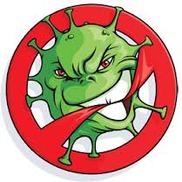
This is part 2 of a 3 part blog on antimicrobial resistance.
Part 1 – 5 Easy Things You Can Do To Reduce Antimicrobial Resistance and a primer on the issue of antimicrobial resistance
Part 2 – Alternatives to Medicinal Antimicrobial Use
Part 3- Antimicrobial Resistance – The Science Stuff
As you can read in Part 1 of this blog series, the impetus for the series was the World Health Organization’s release of the "Antimicrobial resistance: global report on surveillance 2014". From the report overview:
“The report makes a clear case that resistance to common bacteria has reached alarming levels in many parts of the world and that in some settings, few, if any, of the available treatments options remain effective for common infections.”
The good news…
There is evidence that suggests that antimicrobial resistant ‘superbug’ populations will lose their antimicrobial resistance if it is no longer needed – meaning that if antimicrobials are rarely used and the ‘superbug’ populations are no longer exposed to antimicrobials the populations will revert back to being susceptible to antimicrobials.
The even better news…
If you keep reading below you will learn about some effective, natural alternatives you can use to reduce you and your family’s reliance on topical and oral antimicrobial (antibacterial, antiviral, antiparasitic and antifungal) drugs.
The best news…
Unlike pharmaceutical antimicrobials that can upset and weaken you system (e.g. candida infections resulting from antibiotic use) homeopathic & herbal treatments combined with nutritional support will strengthen your system and leave you more resistant to subsequent microbial infections.
Alternatives to topical lotions/salves for minor wounds.
Herbal Treatment
The intent of using of topical first aid lotion/salve is to
- Speed healing
- Reduce pain
- Reduce scaring
- Reduce the risk of infection
In my family we rely on a first aid ointment that is loaded with things like comfrey, chickweed, plantain leaf, tea tree oil and burdock root. For minor eye irritations we use a witch hazel eyewash – available at most major drug stores.
If you are buying a first aid lotion/salve look for ones that are:
- 100% natural
- Set with beeswax and/or use coconut oil
- Antimicrobial - chickweed, burdock, echinacea, marigold, thyme, etc.
- Antiseptic – tea tree, yarrow, lavender, etc.
- Vulnerary (wound healing) - comfrey, goldenseal, plantain leaf, etc.
DIY First-aid Ointment/Salve and DIY First-aid Spray
Homeopathic Treatment
Homeopathic treatment is generally not needed for uncomplicated superficial wounds. Homeopathy is great for:
- Conjunctivitis (pink eye)
- Boosting natural immunity & healing
- Reducing pain
- Recurrent skin conditions/infections
- Progressed infections
- Wounds that are not healing well
- Second & third degree burns
Consulting a professional is a great idea, but it not always a practical option of minor and/or first-aid issues. In these cases, with a little guidance, it is quite easy to effectively treat yourself and your family. A good starting point is the Summer First-aid guide. There are also lots of reference books (I like Sven Sommer’s Little Book of Homeopathy) and even quite a few smart phone apps that can guide you.
Contact me if you are interested in a homeopathic first aid kit tailored to your specific needs, including an easy-to-understand treatment guide.
Nutritional Support
The strength of your immune system will determine how well you will be able to fend off microbial infection. A strong immune system requires a diet that is:
- Rich in a variety of whole, real foods…especially fruits & vegetables, whole grains, nuts & seeds, and legumes
- Low in sugar & refined carbohydrates
- Low in alcohol & caffeine
- Balanced with good fats (coconut, avocado, olive, organic butter)
- Balanced with high quality proteins
For an extra boost, the addition of foods rich in antimicrobials (e.g. raw garlic, limes, etc.), immune boosting inulin (e.g. Jerusalem artichokes), and probiotics (e.g. yogurts, kefir, naturally fermented foods) will improve your ability to prevent and fight microbial infections.
Alternatives for oral antimicrobial use.
Oral antimicrobials (antibacterial, antiviral, antiparasitic and antifungals) are prescribed for such a wide variety of conditions and infections that it is impossible to identify all of the natural treatment alternatives for each condition in this post. The information below is intended to give you an idea of the treatment options that are available.
Before you turn to pharmaceutical antimicrobials please consider talking to me or your health care provider about the herbal, homeopathic and nutritional options best suited to your particular condition.
If you are interested in a more DIY approach you can find some condition specific information on this blog, e.g. Cold Season Part 2, Cold Season Part 3, Summer First-aid…and I am adding new stuff all of the time.
Herbal Treatment
Herbal treatments have a direct impact on your body. Herbals can be employed: as direct antimicrobial agents; as general tonics to stimulate, support and nourish your immune system; and, to provide temporary relief from problematic symptoms, e.g. pain, sinus congestion, etc.
Often with herbal treatment the delivery/application method that will determine how a herbal treatment will work. A great example of this is garlic: garlic oil when applied directly into an infected ear is a powerful direct antimicrobial agent; on the other hand, when raw garlic is ingested it acts as a stimulant for the immune system and as a systemic antibiotic.
I have found that herbal and homeopathic treatments applied in combination are highly effective.
Homeopathic Treatment
Homeopathic treatment is holistic. In cases of microbial infection a properly selected homeopathic remedy will simultaneously stimulate your immune system and target the problem.
Hundreds of years of clinical evidence has proven that homeopathy can quickly and effectively treat a huge variety of microbial infections. In my own practice I actually look forward to treating urinary tract infections – I know that sounds weird, but I really enjoy seeing patients so quickly become completely symptom free…often in under an 30 minutes!
Contact me or talk to your health care provider about the homeopathic remedy best suited to your particular condition.
Nutritional Support
Regardless of whether or not you are using a herbal, homeopathic or pharmaceutical approach to address a microbial infection, it makes sense to use good nutrition to strengthen & protect your health.
The basic nutritional advice provided above is a great starting point, there are also specific foods and supplements that will help you fight microbial infections such as: pumpkin & sesame seeds to treat parasites; pineapple (bromelain) to break down the mucus in bronchitis and pneumonia; lysine rich foods to impede viral replication; cranberries and blueberries for urinary tract infections; etc.
Contact me or talk to your health care provider about nutritional support to help you recover from a microbial infection.

 RSS Feed
RSS Feed
